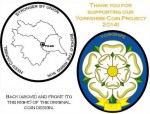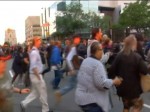Weekly World Numismatic News for January 17, 2021
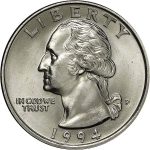 The president has signed the last numismatic-related bill this past week. On January 13, 2021, the president signed the Circulating Collectible Coin Redesign Act of 2020 (Public Law No. 116-330). It was the last possible day to sign the bill. If he did not sign it, the bill would be subjected to a pocket veto.
The president has signed the last numismatic-related bill this past week. On January 13, 2021, the president signed the Circulating Collectible Coin Redesign Act of 2020 (Public Law No. 116-330). It was the last possible day to sign the bill. If he did not sign it, the bill would be subjected to a pocket veto.
- H.R. 1923: Circulating Collectible Coin Redesign Act of 2020
Sponsor: Rep. Barbara Lee (D-CA)
LAST ACTION: Signed by the President and became Public Law No: 116-330. — Jan 13, 2021
The law will require the U.S. Mint to redesign the quarters’ reverse through 2030, starting in 2022.
Prominent American Women Quarters
For the quarters issued between 2022 and 2025, “The design on the reverse side of each quarter dollar issued under this subsection shall be emblematic of the accomplishments and contributions of one prominent woman of the United States.” The U.S. Mint will issue “up to” five quarters per year and confer with several groups to determine who receives the honor.
United States Semiquincentennial Coins
The United States will celebrate its seniquincentennial (250th Anniversary) on July 4, 2026. In celebration of the event, the law states that the U.S. Mint will issue the following coins:
- QUARTERS: 2026 quarters “with up to five different designs emblematic of the United States semiquincentennial.” One quarter must be design to be emblematic of the contribution of a woman or women.
- DOLLARS: orders the Mint to issue “$1 dollar coins with designs emblematic of the United States semiquincentennial.” These dollar coins will be issued in addition to the Native American and Innovation dollars.
Youth Sports Program
The law requires the U.S. Mint to celebrate youth sports with changes to the quarter and half-dollars to correspond to the Summer Olympic games of 2028 and the Winter games of 2030. This program will run from 2027 through 2030.
- QUARTERS: Up to five coins issued each year “shall be emblematic of one sport played by American youth.”
- HALF-DOLLARS: Up to five coins issued each year “emblematic of one Paralympic sport.”
- MEDALS: The law authorizes the U.S. Mint to create “medals with designs emblematic of the sport honored with the issuance of the coin.”
Medals for the 2028 Olympic Games in Los Angeles
The law authorizes the U.S. Mint “to design and manufacture medals for awarding at the 2028 Olympic Games in Los Angeles, California.” The law makes it the first time in the modern Olympics history that the U.S. Mint will create the games’ medals. Previously, the Olympic committees had a private vendor create the medals. According to the International Olympic Committee website, medals for the games played in the United States were created by the following:
| Year | Games | Location | Minter of the Medals |
|---|---|---|---|
| 1904 | Summer | St. Louis | Diege & Clust |
| 1932 | Summer | Los Angeles | The Whitehead & Hoag Co. |
| 1932 | Winter | Lake Placid | Robbins Company |
| 1960 | Winter | Squaw Valley | Herff Jones |
| 1980 | Winter | Lake Placid | Medallic Art Co. |
| 1984 | Summer | Los Angeles | Jostens, Inc |
| 1996 | Summer | Atlanta | Reed and Barton |
| 2002 | Winter | Salt Lake City | O.C. Tanner |
Silver Bullion Coins
The new law allows the U.S. Mint to continue to make the five-ounce silver bullion coins that correspond to each of the quarter and half-dollar programs. Interestingly, the silver hockey-puck-sized coins appear to be popular and will continue to be available to collectors and investors.
Also added to the law is the ability to strike factional silver bullion coins with the same designs. It is uncertain if a half-ounce or quarter-ounce silver coin will sell, but we will find out.
Obverse of the Coins
George Washington will continue to appear on the obverse but “be designed in a manner, such as with incused inscriptions, so as to distinguish it from the obverse design used during the previous quarters program.”
The bill includes similar language for the image of John F. Kennedy on the 2026 Semiquincentennial half-dollar.
And now the news…
 → Read more at beloitdailynews.com
→ Read more at beloitdailynews.com
 → Read more at news.justcollecting.com
→ Read more at news.justcollecting.com
 → Read more at ancient-origins.net
→ Read more at ancient-origins.net
 → Read more at express.co.uk
→ Read more at express.co.uk
No legislative report this month
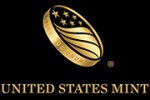 When the calendar flips to August, my wife begins to complain about the humidity and wanting to go “home” to Maine where she grew up. For me, the kid from south Brooklyn, August begins the last push to the end of the federal government’s fiscal year. With congress out of town, many agencies stop worrying about policy shifts and prepare for the new fiscal year. August is the calm before the policy storms.
When the calendar flips to August, my wife begins to complain about the humidity and wanting to go “home” to Maine where she grew up. For me, the kid from south Brooklyn, August begins the last push to the end of the federal government’s fiscal year. With congress out of town, many agencies stop worrying about policy shifts and prepare for the new fiscal year. August is the calm before the policy storms.
This year has been unusual in that the weather has been more moderate than usual and world events have changed the tenor for those of us who work for the federal government. These events are not limited to areas of conflict. Those of us working in computer security have noticed an uptick in online criminal activity beyond what you read in the headlines.
With nothing happening on Capitol Hill, let’s look at the news generated by the U.S. Mint.
Following the issues during the sales at all locations for the Kennedy Half-Dollar gold tribute coin, the U.S. Mint suspended sales early and will re-evaluate their process for over-the-counter sales of coins. Sources at the U.S. Mint were surprised with the reaction since there are no mintage limits on the coin.
Subsequently, American Numismatic Association Executive Director Kim Kiick announced that sales of newly released coins by the U.S. Mint would be suspended indefinitely because of security concerns.
As an interesting side note, the price of gold has dropped and is close to the price that would lower the purchase price if ordered from the U.S. Mint.
Later in the month, the U.S. Mint announced that the Philadelphia facility broke a single day production record by producing 42.44 million coins for circulation. They beat their previous record of 32.28 million coins set in October 2013. The U.S. Mint produced a total of 1.33 billion coins for circulation in July with more than half of those being produced in Philadelphia.
The branch mint in Philadelphia is the world’s largest coin factory. No other mint in the world can produce the number of coins that can be struck at Philadelphia. The second largest coin factory is the branch mint in Denver.
Record production is more than an accomplishment for the U.S. Mint. They are being struck to fulfill orders for circulating coins from the Federal Reserve. This means that the Fed needs the coins to place into circulation which is a good sign for the economy. If the economy was slower, as it was a few years ago, the demand for coins would have slowed to where the U.S. Mint would have to reduce production.
The U.S. Mint has hired Naxion Research of Philadelphia to poll customers “to share [their] insights on new U.S. Mint products for 2015.” Customers were chosen at random to participate. Those who ordered products from the U.S. Mint via their website were sent an email invitation to take the survey. A separate group who ordered products by the telephone or by mail order was sent a paper survey form.
Survey results are due by September 15, 2014 regardless of the format used.
Kick start a challenge
Think about how you would feel to help a community create a challenge coin for itself. In the process of helping the community, you can collect one of these challenge coins for yourself. If you provide enough assistance, then you can own one of the lowest numbered challenge coin.
Buried in my inbox was a note about a KickStarter project to create a challenge coin for Yorkshire, U.K. For as little as £6, (currently $9.94) you can own a coin numbered between 100 and 999. If you can afford £20 ($33.14), you can own a coin numbered between 10 and 20. Sorry, but the lower numbers have been purchased. All you have to do is go to KickStarter and fund the project.
For those not familiar with KickStarter, it is a website used to allow interested people to fund projects of their choosing. Kickstarter projects are mostly creative endeavors or involve some creativity in art, music, and technology where you receive awards for your level of funding. The financing model is called “crowd sourcing” and has been used effectively to launch films for the Sundance Film Festival, a skate park in Philadelphia, a photo exhibit on the site of the Berlin Wall, and the Fitbit smart watch.
KickStarter uses and all or nothing model meaning that if the project only receives the money if it is fully funded. If it does not, your credit card will not be charged and you will not receive your premium, of course. For the Yorkshire challenge coin, they are asking for £3,000 ($4,970.52). Currently, there is £220 pledged ($364.50) with 3 days to go. The funding drive ends on Saturday, August 30 at 1:36 AM EDT.
What the heck… it seems like a very cool idea. Let’s see if we can help put the project over the top and get it funded. Even if you do not want the coin, you can spare £3 (about $5) to help!
Note that there are extra postage requirements for shipping outside of the United Kingdom.
ANA must examine ethics of dealers
The media reported that those waiting for to purchase the coins were not collectors. Most were being paid by dealers to be on the line in order to get around the U.S. Mint purchasing limits. As part of their attempt to game the system, these dealers put collectors and the general public in danger by handing large amount of cash to needy people who did not conduct themselves in a manner that is consistent with the ANA Code of Ethics. Since those behaving badly were being paid by the dealers, they are representatives of the dealers, making the dealers responsible for the action of those they employ.
In case those dealers have forgotten, according to the ANA Code of Ethics:
- To conduct myself so as to bring no reproach or discredit to the Association, or impair the prestige of the membership therein.
This applies directly to the dealers whose action caused problems at the World’s Fair of Money. Since sales of the coin were made at the U.S. Mint’s booth on the bourse floor, this is a case where the dealers who participated in this discredited the Association by creating an environment that potentially jeopardized the security of the show. By putting the security in jeopardy and bringing this negative publicity to the World’s Fair of Money, the participating dealers impaired the prestige of the membership especially when they had to put the U.S. Mint and the ANA Executive Director in the position to have to act as a parent to dealers acting like impetuous children.
- To base all of my dealings on the highest plane of justice, fairness and morality, and to refrain from making false statements as to the condition of a coin or as to any other matter.
Although the launch of the 2014 National Baseball Hall of Fame commemorative coin during the Whitman Baltimore Expo was a success, there was a feeling that the sales format did not give collectors a chance to purchase the coin. In order to promote the broader sales of the coin, the U.S. Mint adjusted its sales requirement to limit over-the-counter sales in order to give more collectors the opportunity to purchase the new Kennedy gold coin. How could the U.S. Mint or the ANA know that the sales of a coin that does not have any mintage limits would cause problems when the sales of a commemorative coin with mintage limits went without significant issue?
Unfortunately, the intent of the U.S. Mint was impeded by some dealer’s plane of justice by their action. By immorally trying to get around the U.S. Mint’s sales limits by using questionable methods to unfairly stack the line against the collector, the dealers were making false statements to a government entity, and thus the public it represents, as to their eligibility to purchase the coin.
The appalling images provided by Denver television news (see below) of the behavior of those described as homeless on behalf of the dealers trying to get around the sales limits not only is not only unjust to legitimate purchasers and immoral, but as ANA members discredits themselves as ANA members.
Therefore, I am accusing ALL of the ANA members who hired these people that acted on their behalf of the ANA dealers with violation of the ANA Code of Ethics. The ANA Board of Governors must take action to restore the organization’s credibility by suspending those involved as per the ANA Bylaws!
Report to ANA Board of Governors on new web service security
Since joining the Technology Committee, my goal has been to ensure that the underlying architecture, the computers and network that connects them, is robust enough to support anything the ANA would want to do and to make sure that it is secure so that the ANA does not add itself to the list of recent attacks.
From the beginning of this project, many decisions were made that has lead to the system being designed in a way that could support anything the software can accomplish. A company with an excellent industry reputation hosts the physical computers. Also, the architecture of the computers, the way they are setup and connected to each other, is done in a way to allow for growth while being able to maintain security.
As someone who has been working in computer security for more than 25 years, it was important for me to make sure that not only my information was kept safe, but that of all ANA members were also protected. I am happy to report that the systems and software supporting the ANA website are properly hardened to resist attack.
I understand that there will be the ongoing question “is the site secure.” The problem is that there are threats out there that we do not know about, threats that have yet to be discovered or created, accidental mistakes, and errors that can cause problems. I can report that this system is designed to protect against known attacks, it is also design to catch many errors and repel as many potential attacks as possible.
In computer security, we work on identifying the risks and what it will take the mitigate them based on how confidential the data is, the integrity that has to be maintained, and how it is to be made available. One area of concern was the personally identifiable information, or PII, of member data including their login information and the credit cards they use with the ANA.
You might have read the news were it was reported that overseas hackers stole over one billion passwords throughout the Internet. I can report that the method they used to steal all those passwords will NOT work on the ANA’s website. Those same protections will help keep the PII of ANA members safe.
Another area of concern what the safety of member credit card information. To protect the confidentiality of the ANA member’s credit card information it is important to note that anytime the credit card information is communicated from one computer to another, it is encrypted using state-of-the-art encryption. After providing the ANA with the credit card and is processed, the services the ANA use to manage member information will not keep the credit card information. The credit card information is deleted and all that the ANA keeps is a transaction number that can be used to verify the payment with the credit card processor.
My family and friends know that when it comes to computer security, I am very paranoid. Many resisted doing certain online tasks like e-filing their taxes until I was satisfied with the security of the site. If a member was to ask me if I would use and trust the website as designed today, I would give it a hardy endorsement and say that I would register even if I was not a member of the Technology Committee. I am convinced everything was done to maintain the integrity of the membership information while keeping it confidential.
Finally, I would like to congratulate everyone on a job well done. Specifically, I would like to thank Jake Sherlock for delivering this message for me and congratulate him on a job well done. I also would like to send my highest commendation to Ann Rahn, the ANA’s project manager, who not only did a fantastic job herding the cats but also put up with the special quirks of the members of the Technology Committee. The next time I see them, I owe them a beverage of their choosing!
Thank you for allowing me to be part of this process.
Kennedy gold opens strong
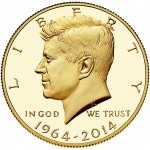 Although I am not able to attend this year’s World’s Fair of Money, I have been keeping up with the news coming out of Rosemont. Amongst the interesting news reports are those about the long lines collectors were standing in for the 2014 50th Anniversary Kennedy Half-Dollar Gold Proof Coin. There was even a story that claimed dealers paid homeless people to stand in line because of the U.S. Mint’s purchase limit of one coin per person.
Although I am not able to attend this year’s World’s Fair of Money, I have been keeping up with the news coming out of Rosemont. Amongst the interesting news reports are those about the long lines collectors were standing in for the 2014 50th Anniversary Kennedy Half-Dollar Gold Proof Coin. There was even a story that claimed dealers paid homeless people to stand in line because of the U.S. Mint’s purchase limit of one coin per person.
Watching the scene from afar gives it a reality television-like feel. Just like reality television, I find it difficult to understand the appeal of having to be the first or one of the first to purchase the coin. In this case the people who bought the first coin had the coin slabbed and was paid $20,000 for the coin, what about the people standing in line behind them? Were they expecting to resell the coin to a dealer desperate to have the coin in their inventory? Was the line there representing dealers who will advertise that they have the coin from the first day of issue and mark up the price for those who collect the labels and not the coin?
If you are interested in purchasing the coin and not worried about the hype, I recommend that you buy the coin directly from the U.S. Mint. First, the U.S. Mint has already announced that there will not be a production limit. While there are initial sales limit, the U.S. Mint will strike as many as ordered. Second, those coins purchased at the U.S. Mint booth at the World’s Fair of Money will likely be removed from the U.S. Mint packaging and entombed in one of the third party grading company’s hunk of plastic. The price will be overly inflated.
When you buy the coin from the U.S. Mint, the price you will pay is the market price of three-quarters of a troy ounce of gold, the full cost of manufacture, and the packaging. According to the U.S. Mint, “The coins are encapsulated and packaged in a single custom-designed, brown mahogany hardwood presentation case with removable coin well and are accompanied by a Certificate of Authenticity.” That mahogany hardwood presentation case is probably not cheap. If it is the same case that has been used for past special coin programs, then it is a nice package and should display the coin nicely. You will probably not receive the presentation case from the dealer that slabbed the coin. In fact, some dealers have started to sell the empty presentation cases without the coin—essentially, double-dipping at the expense of the purchaser of the coin.
The final reason to buy the coin directly from the U.S. Mint online or via the telephone is that there is a limit of five coins per household. When you buy the coin at one of the U.S. Mint facilities or this week at the World’s Fair of Money, you are limited to buying one coin and that there is a daily sales limit of 500 coins at each location.
With no offense intended to dealers who will have plenty of opportunities to make money on this coin in the future, I recommend that Coin Collectors Blog readers who want to purchase a coin for their own collection to buy it directly from the U.S. Mint. Even if the price of gold rises, the U.S. Mint pricing table [PDF] for these coins shows that the difference is about $35 per pricing band. I suspect that it will be less than the premium that many dealers will add to the price of the coin at the same time it is available from the U.S. Mint, except that they can sell you the coin now and you will not have to wait.
First Day Sales Figures
The U.S. Mint released their first day sales figures for the 2014 50th Anniversary Kennedy Half-Dollar Gold Proof Coin:
| Online/Call Center Sales | 54,825 |
| ANA World’s Fair of Money | 493 |
| U.S. Mint Headquarters, Washington, DC | 376 |
| Philadelphia Branch Mint | 500 |
| Denver Branch Mint | 500 |
| All sites | 56,694 |

